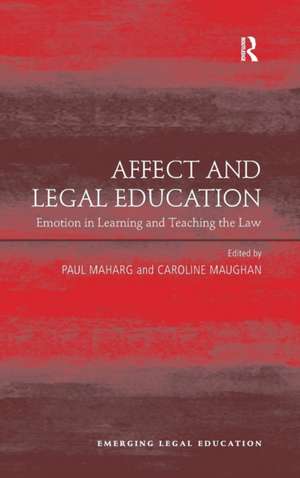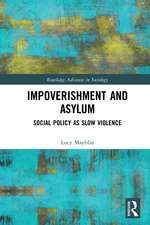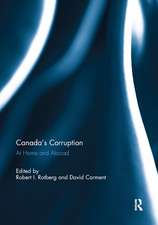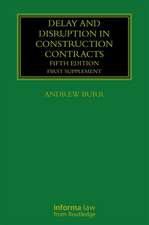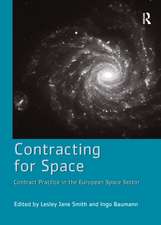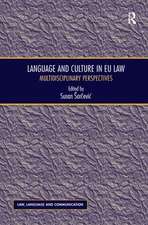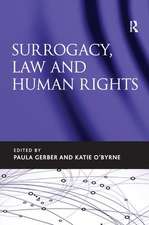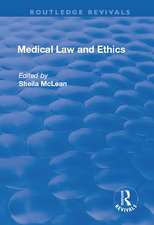Affect and Legal Education: Emotion in Learning and Teaching the Law: Emerging Legal Education
Editat de Caroline Maughan, Paul Mahargen Limba Engleză Hardback – 28 oct 2011
| Toate formatele și edițiile | Preț | Express |
|---|---|---|
| Paperback (1) | 390.87 lei 3-5 săpt. | +21.98 lei 6-12 zile |
| Taylor & Francis – 27 feb 2017 | 390.87 lei 3-5 săpt. | +21.98 lei 6-12 zile |
| Hardback (1) | 1061.69 lei 6-8 săpt. | |
| Taylor & Francis – 28 oct 2011 | 1061.69 lei 6-8 săpt. |
Din seria Emerging Legal Education
- 8%
 Preț: 390.87 lei
Preț: 390.87 lei -
 Preț: 311.18 lei
Preț: 311.18 lei -
 Preț: 311.47 lei
Preț: 311.47 lei -
 Preț: 489.26 lei
Preț: 489.26 lei -
 Preț: 469.34 lei
Preț: 469.34 lei -
 Preț: 469.34 lei
Preț: 469.34 lei -
 Preț: 469.34 lei
Preț: 469.34 lei - 28%
 Preț: 825.21 lei
Preț: 825.21 lei -
 Preț: 489.26 lei
Preț: 489.26 lei -
 Preț: 384.86 lei
Preț: 384.86 lei -
 Preț: 389.31 lei
Preț: 389.31 lei - 17%
 Preț: 259.98 lei
Preț: 259.98 lei -
 Preț: 370.10 lei
Preț: 370.10 lei -
 Preț: 349.71 lei
Preț: 349.71 lei -
 Preț: 389.66 lei
Preț: 389.66 lei -
 Preț: 383.71 lei
Preț: 383.71 lei -
 Preț: 389.66 lei
Preț: 389.66 lei - 18%
 Preț: 1120.11 lei
Preț: 1120.11 lei - 18%
 Preț: 1500.18 lei
Preț: 1500.18 lei
Preț: 1061.69 lei
Preț vechi: 1294.73 lei
-18% Nou
Puncte Express: 1593
Preț estimativ în valută:
203.17€ • 213.63$ • 167.86£
203.17€ • 213.63$ • 167.86£
Carte tipărită la comandă
Livrare economică 17 aprilie-01 mai
Preluare comenzi: 021 569.72.76
Specificații
ISBN-13: 9781409410263
ISBN-10: 1409410269
Pagini: 338
Ilustrații: Includes 5 b&w illustrations
Dimensiuni: 156 x 234 x 21 mm
Greutate: 0.65 kg
Ediția:New ed
Editura: Taylor & Francis
Colecția Routledge
Seria Emerging Legal Education
Locul publicării:Oxford, United Kingdom
ISBN-10: 1409410269
Pagini: 338
Ilustrații: Includes 5 b&w illustrations
Dimensiuni: 156 x 234 x 21 mm
Greutate: 0.65 kg
Ediția:New ed
Editura: Taylor & Francis
Colecția Routledge
Seria Emerging Legal Education
Locul publicării:Oxford, United Kingdom
Cuprins
Contents: Introduction, Paul Maharg and Caroline Maughan; Part I Affect, Legal Education and Neuroscience: Why study emotion?, Caroline Maughan; Learning and the brain - an overview, Richard Roche; Enhancing self-control: insights from neuroscience, Lorraine Boran and David Delany. Part II Affect and Legal Education: Can litigators let go? The role of practitioner-supervisors in clinical legal education programmes, Sara Chandler; Instead of a career: work, art and love in university law schools, Anthony Bradney; What do academics think and feel about quality?, Chris Maguire. Part III Affect and Learning: From Socrates to Damasio, from Langdell to Kandel: the role of emotion in modern legal education, Alan M. Lerner; Legal understanding and the affective imagination, Maksymilian Del Mar; What students care about and why we should care, Graham Ferris and Rebecca Huxley-Binns; The body in (e)motion: thinking through embodiment in legal education, Julian Webb; Developing professional character - trust, values and learning, Karen Barton and Fiona Westwood; Addressing emotions in preparing ethical lawyers, Nigel Duncan; Space, absence, silence: the intimate dimensions of legal learning, Paul Maharg; Index.
Notă biografică
Paul Maharg is Professor of Law at the Australian National University, and Professor of Law at Nottingham Law School. He has published extensively in the areas of legal education and legal critique. He has worked with regulators, law firms and law schools in England, Scotland, Canada, USA, Hong Kong and Australia. Caroline Maughan is a Principal Lecturer in Law and Director of Teaching and Learning at Bristol Law School, University of the West of England. She specializes in skills-based legal education. She currently teaches on the Bar Vocational Course and LLB year 3. She is a co-author of the OUP LPC manual 'Lawyers' Skills'. Her research interests are centred around legal education. She has published widely on skills-based, experiential and collaborative learning, and with Julian Webb co-edited Teaching Lawyers' Skills (1996) and co-wrote the student text Lawyering Skills and the Legal Process, (CUP Law in Context series, 2nd ed 2005). She has facilitated a number of workshops at conferences and staff development events across the UK.
Recenzii
'By throwing light on the ways in which emotions play a significant role in both learning and teaching law, this international collection from some of the leading experts in legal education draws our attention to a much-neglected aspect of the educational process. It deserves to be widely read, seeking to enrich our understanding both of law students and law teachers by revealing just how crucial the affective domain is in relation to the rational thinking that we generally assume lies at the heart of legal education.' Fiona Cownie, Keele University, UK 'This pioneering text devotes long overdue attention to the role of the affective domain in legal education and compels action: at stake is the psychological and ethical wellbeing of our students, their educators and the practicing profession. To accommodate affect is not to oppose cognitive and lawyering excellence, but to enhance it. This volume will be essential reading for those committed to the moral-ethical development of a functioning and humane legal profession.' Sally Kift, Queensland University of Technology, Australia '... intellectually stimulating, wide-ranging, extremely well-written and long overdue... so multi-faceted and multi-layered that a second volume is doubtless warranted...' Hibernian Law Journal
Descriere
This text, the first full-length book study of the subject, seeks to make emotion a central topic of research for legal educators, and restore the power of emotion in our teaching and learning. Interdisciplinary and wide-ranging in its reference, it breaks new ground in its analysis of the educational lifeworld of situations, communities, actors and interactions in legal education.
